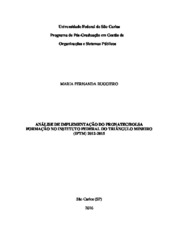| dc.contributor.author | Ruggiero, Maria Fernanda | |
| dc.date.accessioned | 2017-09-25T12:56:34Z | |
| dc.date.available | 2017-09-25T12:56:34Z | |
| dc.date.issued | 2016-10-17 | |
| dc.identifier.citation | RUGGIERO, Maria Fernanda. Análise de implementação do PRONATEC/Bolsa Formação no Instituto Federal do Triângulo Mineiro (IFTM) 2012-2015. 2016. Dissertação (Mestrado em Gestão de Organizações e Sistemas Públicos) – Universidade Federal de São Carlos, São Carlos, 2016. Disponível em: https://repositorio.ufscar.br/handle/ufscar/9110. | * |
| dc.identifier.uri | https://repositorio.ufscar.br/handle/ufscar/9110 | |
| dc.description.abstract | This research deals with a process analysis of implementation of the Nacional Program of Access to technical education and job/scholarship education in the Federal Institute of Education, Science and technology of the Triângulo Mineiro Campus Uberlândia and Uberlândia Centro. Between the years of 2012 and 2015, aiming to identify what form and factors of political-institutional conditioned the implementation and its sub processes and propose an instrument in order to evaluate the program. Primarily we aimed to identify the objectives of the program and the strategy of implementation developed by the Federal Govern, so the expected results could be achieved. From the recognition of the implementation strategy was built an evaluation model of the implementation of PRONATEC / Scholarship education in Federal Education Institutions. Afterwards through a case study, we sought to evaluate in what way some political-institutional variants condition the implementation of PRONATEC/SE. The data of the case study to recognize de conditioning factors of the implementation processes were collected by the management report, execution programme documents and a semi structured interview with the implementing agents of the program in a local level. The research results aim that the PRONATEC/SE in IFTM implementation was favored mainly by the commitment and active performance of the implementing agents in coordinating alongside with the demanding collaborators the course offers; by the infrastructure use and the local human resources in the institution and the payment of the student assistance to the students. The main obstacles found in the implementation process were the transference financial resource delay; reduced time to articulate the course offers; absence of clear goals to be achieved in a heterogeneous profile of the students | eng |
| dc.description.sponsorship | Não recebi financiamento | por |
| dc.language.iso | por | por |
| dc.publisher | Universidade Federal de São Carlos | por |
| dc.rights.uri | Acesso aberto | por |
| dc.subject | PRONATEC/BF | por |
| dc.subject | Implementação | por |
| dc.subject | Avaliação | por |
| dc.subject | Implementation | eng |
| dc.subject | Evaluation | eng |
| dc.title | Análise de implementação do PRONATEC/Bolsa Formação no Instituto Federal do Triângulo Mineiro (IFTM) 2012-2015 | por |
| dc.type | Dissertação | por |
| dc.contributor.advisor1 | Justo, Carolina Raquel Duarte de Mello | |
| dc.contributor.advisor1Lattes | http://lattes.cnpq.br/9209489935777843 | por |
| dc.description.resumo | Esta pesquisa trata de uma análise do processo de implementação do Programa Nacional de Acesso ao Ensino Técnico e Emprego/Bolsa Formação no Instituto Federal de Educação, Ciência e Tecnologia do Triângulo Mineiro Campus Uberlândia e Uberlândia Centro entre os anos de 2012 e 2015, buscando identificar de que forma fatores político-institucionais condicionaram a implementação e seus subprocessos e propor um instrumento para avaliação do programa. Para tanto primeiramente buscou identificar os objetivos do programa e a estratégia de implementação desenhada pelo Governo Federal para que os resultados desejados fossem alcançados. A partir da identificação da estratégia de implementação foi construído um modelo de avaliação da implementação do PRONATEC / Bolsa Formação nas instituições de Ensino Federal. Posteriormente através de um estudo de caso, buscou-se avaliar de que forma algumas variáveis político-institucionais condicionam a implementação do PRONATEC/BF. Os dados do estudo de caso para identificação dos fatores condicionantes do processo de implementação foram coletados por meio de relatórios de gestão, documentos de execução do programa e entrevista semiestruturada com os agentes implementadores do programa no nível local. Os resultados da pesquisa aponta que a implementação do PRONATEC/BF no IFTM foi favorecida principalmente pelo esforço e atuação ativa dos agentes implementadores para articular juntos aos parceiros demandantes a oferta dos cursos; pela utilização da infraestrutura e dos recursos humanos já existentes na instituição e pelo pagamento da assistência estudantil aos estudantes. Os principais obstáculos encontrados no processo de implementação foram o atraso no repasse do recurso financeiro; tempo reduzido para articular a abertura dos cursos; ausência de metas claras a serem cumpridas e perfil heterogêneo dos alunos. | por |
| dc.publisher.initials | UFSCar | por |
| dc.publisher.program | Programa de Pós-Graduação em Gestão de Organizações e Sistemas Públicos - PPGGOSP | por |
| dc.subject.cnpq | CIENCIAS SOCIAIS APLICADAS::ADMINISTRACAO::ADMINISTRACAO PUBLICA::ORGANIZACOES PUBLICAS | por |
| dc.ufscar.embargo | Online | por |
| dc.publisher.address | Câmpus São Carlos | por |
| dc.contributor.authorlattes | http://lattes.cnpq.br/8232223559924938 | por |
